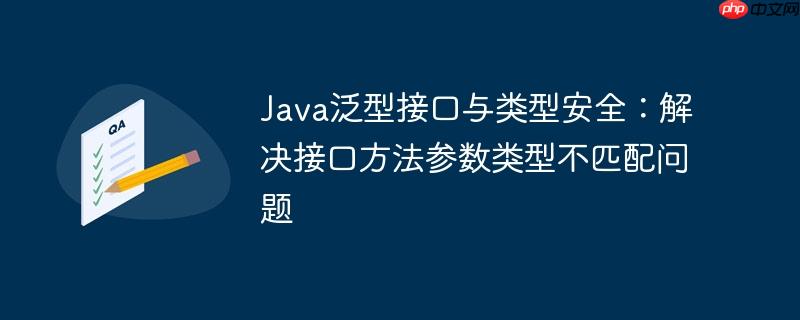
在java面向对象编程中,接口(interface)是定义行为规范的关键机制。然而,初学者在设计接口时,常会遇到一个常见问题:当接口方法定义了通用类型(如object)的参数,而实现类希望使用更具体的类型时,会遭遇编译错误。
考虑以下场景:我们有一个ITuning接口,旨在提供车辆的竞速能力,其中包含一个doRace方法用于比较两辆车。
// 原始接口定义
public interface ITuning {
void doRace(Object o1);
}当一个Car类尝试实现这个接口时,如果它希望doRace方法直接接收另一个Car对象进行比较(例如基于马力hp),可能会写出如下代码:
// Car类尝试实现ITuning接口
public class Car extends Vehicle implements ITuning {
private int hp; // 马力
public int getHp() {
return hp;
}
// 预期实现:直接比较Car对象
public void doRace(Car o1) { // 注意:这里的参数类型是Car
if (this.getHp() > o1.getHp()) {
System.out.println("当前车辆获胜!");
} else if (this.getHp() < o1.getHp()) {
System.out.println("对手车辆获胜!");
} else {
System.out.println("平局!");
}
}
}此时,编译器会报错:The type Car must implement the inherited abstract method ITuning.doRace(Object)。这是因为Car类实现的doRace(Car o1)方法与接口中定义的doRace(Object o1)方法签名不匹配。Java中,方法参数类型必须严格匹配,不能像返回类型那样支持协变(covariant return types)。虽然Car是Object的子类,但doRace(Car)并不是doRace(Object)的重写。
解决上述问题的最佳实践是利用Java的泛型(Generics)特性来定义接口。通过使接口泛型化,我们可以在实现接口时指定具体的类型参数,从而确保方法签名的类型安全和一致性。
立即学习“Java免费学习笔记(深入)”;
我们将ITuning接口修改为泛型接口ITuning<T>,其中T代表一个类型参数。这样,doRace方法的参数类型就可以是T。
// 泛型接口定义
public interface ITuning<T> {
/**
* 执行竞速比较。
* @param other 另一个参与竞速的对象。
*/
void doRace(T other);
}现在,Car类在实现ITuning接口时,可以指定T的具体类型为Car。
// Car类实现泛型ITuning接口
public class Car extends Vehicle implements ITuning<Car> {
private int hp; // 马力
public Car(int hp) {
this.hp = hp;
}
public int getHp() {
return hp;
}
/**
* 实现竞速方法,直接接收Car类型参数。
* 使用@Override注解确保正确重写接口方法。
*/
@Override
public void doRace(Car other) {
System.out.println("--- Car vs Car Race ---");
System.out.println("我的马力: " + this.getHp() + ", 对手马力: " + other.getHp());
if (this.getHp() > other.getHp()) {
System.out.println("当前车辆 (HP:" + this.getHp() + ") 获胜!");
} else if (this.getHp() < other.getHp()) {
System.out.println("对手车辆 (HP:" + other.getHp() + ") 获胜!");
} else {
System.out.println("平局!");
}
}
// 假设Vehicle是一个抽象类
// abstract class Vehicle { /* ... */ }
// 其他Car类特有方法...
}通过这种方式,Car类成功地实现了ITuning<Car>接口,并且doRace方法的参数类型直接就是Car,避免了类型转换的麻烦和潜在的ClassCastException。
如果存在其他车辆类型,例如Motorcycle,它也可以以类似的方式实现ITuning接口:
public class Motorcycle extends Vehicle implements ITuning<Motorcycle> {
private int engineCC; // 发动机排量
public Motorcycle(int engineCC) {
this.engineCC = engineCC;
}
public int getEngineCC() {
return engineCC;
}
@Override
public void doRace(Motorcycle other) {
System.out.println("--- Motorcycle vs Motorcycle Race ---");
System.out.println("我的排量: " + this.getEngineCC() + ", 对手排量: " + other.getEngineCC());
if (this.getEngineCC() > other.getEngineCC()) {
System.out.println("当前摩托车 (CC:" + this.getEngineCC() + ") 获胜!");
} else if (this.getEngineCC() < other.getEngineCC()) {
System.out.println("对手摩托车 (CC:" + other.getEngineCC() + ") 获胜!");
} else {
System.out.println("平局!");
}
}
}public class RaceSimulator {
public static void main(String[] args) {
Car car1 = new Car(300);
Car car2 = new Car(250);
car1.doRace(car2); // 正确调用
System.out.println("\n------------------\n");
Motorcycle moto1 = new Motorcycle(1000);
Motorcycle moto2 = new Motorcycle(1200);
moto1.doRace(moto2); // 正确调用
}
}通过引入泛型接口,我们能够优雅地解决接口方法参数类型不匹配的问题。它不仅提升了代码的类型安全性,减少了运行时错误,还增强了代码的可读性和灵活性,使得接口设计更加健壮和易于扩展。在设计需要处理特定类型对象集合的接口时,优先考虑使用泛型是Java编程中的一项重要最佳实践。
以上就是Java泛型接口与类型安全:解决接口方法参数类型不匹配问题的详细内容,更多请关注php中文网其它相关文章!

每个人都需要一台速度更快、更稳定的 PC。随着时间的推移,垃圾文件、旧注册表数据和不必要的后台进程会占用资源并降低性能。幸运的是,许多工具可以让 Windows 保持平稳运行。

Copyright 2014-2025 https://www.php.cn/ All Rights Reserved | php.cn | 湘ICP备2023035733号